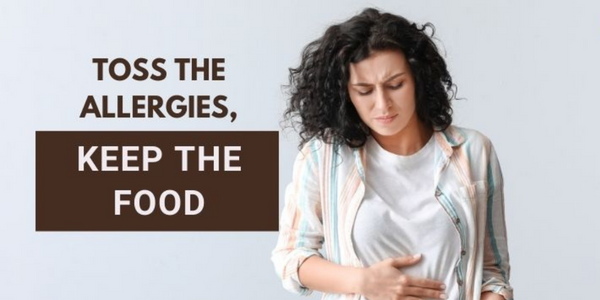Food allergies – we would not wish them on our worst enemy. If you have struggled with them, you know why. Imagine being unable to gorge on nuts, dairy, shellfish, or just about anything worth hogging. No one wants to spend their day puking their guts out or experiencing a diarrheal episode that keeps them tethered to their washroom. And definitely, worse is the prospect of being rushed to the emergency room with a swollen face and throat, plus choking and breathlessness to match the rapidly ascending panic. Now, of course, this sort of situation breeds necessity, and necessity being the mother of invention, solutions have typically catered to treating the cause. But what if we could prevent the problem altogether? What if you could eat the good stuff with zero fears and regrets? Curious? We have big news!
1. The What?
You gotta know your enemy to fight it. So a food allergy happens when your immune system reacts negatively to certain foods for inexplicable reasons. It is much like meeting someone you do not even know and instantly disliking them – illogical and inconvenient, but not improbable. The reason your body specifically takes a dislike for these foods, though, is purely a case of mistaken identity. The immune system sees the proteins in these foods as the mortal enemy – the ones you fight to the death. It then releases some chemicals in response. When it is feeling particularly dramatic, it really does fight to the death (or near-death).
2. Conventional Wisdom
Traditionally, the best advice is to avoid the food you are allergic or intolerant to. Once you have figured out what food item is specifically causing distress, you just suck up the disappointment and avoid the said food. Also, in the event that you slip from this firm resolve (no judgment here if the hogging was premeditated), you could keep antihistamines handy. If you are the sort who has been cursed with the worst luck (anaphylaxis, urticaria, or swelling), you can invest in an EpiPen and hope for the best.
3. Gettin’ Down and Science-y
Now you know the “what-is,” it is high time you heard about the “what-if.” Did you know that your gut contains healthy bacteria that aid the digestive process? When these bacteria are missing or destroyed, they can mess with your whole digestive system, leading to food allergies and unnecessarily dramatic immune responses. Our focus here will be on one specific bacterial compound called butyrate. This one is a big shot in the intestinal world. Butyrate, you see, is essential to maintaining your gut lining and allowing for the growth of good bacteria. In simpler terms, butyrate equals good digestion. An absence of this compound would mean a tiring struggle with leaky guts and food allergies.
4. The Big Reveal!
So why the fuss about butyrate? Because now, finally, hope abounds! Naturally, the solution to missing butyrate would be to provide butyrate orally or otherwise. It is a no-brainer; you did not need us to tell you that. But this is easier said than done. Butyrate smells and tastes horrible, so that leaves it out of the oral administration loop. Now, even if you had the iron-consistency stomach and mind of an adventurer, you would still gain nothing because the bacteria would undergo digestion before reaching its destination (the lower gut). So scientists have devised a pretty radical alternative delivery system – a polymeric micelle. This involves combining a butyrate-containing compound with some other useful compounds. Together, these aggregate and form micelles that effectively cover up the smell and taste. Plus, the gut barrier is restored, the good bacteria stop hiding under rocks, and the digestion process is helped along. The end result? You can counteract the allergies – so, yay!
Despondent food intolerants; meet the silver lining. This is your sign that there may come a day when you can finally kick back at the stuff that kicked you down. Also, om nom nom. It is a pretty good deal if we do say so ourselves.

